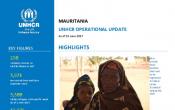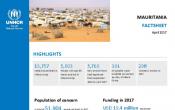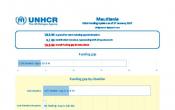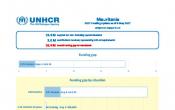Mauritania
Operation: Mauritania
Location
{"longitude":-10,"latitude":21,"zoom_level":0}
Latest update of camps and office locations 21 Nov 2016. By clicking on the icons on the map, additional information is displayed.
Key Figures
| 2016 year-end results | |
| 100% | of registered population in Mbera camp receive monthly food assistance |
| 72% | of primary school-aged children in Mbera camp attended primary school |
| 4,900 | people with specific needs receiving tailored assistance |
| 430 | adults attended literacy courses |
| 20 | litres of water were provided to all refugees in Mbera camp |
| 2017 planning figures | |
| 100% | of Malian refugees in Mbera camp will be provided with identification documents delivered jointly by the authorities and UNHCR |
| 100% | of SGBV survivors will receive appropriate medical and/or psychosocial support |
| 21,000 | people of concern in Mbera camp will receive semi-durable shelters |
| 1,500 | people of concern targeted will benefit from assistance to undertake income-generating activities in Mbera camp |
Latest Updates
People of Concern
4%
Decrease in
2016
2016
| 2016 | 74,735 |
| 2015 | 77,891 |
| 2014 | 76,048 |

[["Refugees",48148],["Refugee-like situation",26000],["Asylum-seekers",587]]
Loading ...
Mauritania
< Back
2016
{"categories":[2012,2013,2014,2015,2016,2017],"budget":[38.14543672,30.18104158,23.75815901,24.368373692,19.53236051,19.39033129],"expenditure":[23.42758068,22.20868457,14.42116683,13.02928311,14.17643259,null]}
{"categories":[2012,2013,2014,2015,2016,2017],"p1":[38.14543672,30.18104158,23.75815901,24.368373692,19.53236051,19.39033129],"p2":[null,null,null,null,null,null],"p3":[null,null,null,null,null,null],"p4":[null,null,null,null,null,null]}
{"categories":[2012,2013,2014,2015,2016,2017],"p1":[23.42758068,22.20868457,14.42116683,13.02928311,14.17643259,null],"p2":[null,null,null,null,null,null],"p3":[null,null,null,null,null,null],"p4":[null,null,null,null,null,null]}
Loading ...
CHOOSE A YEAR
- 2014
- 2015
- 2016
- 2017
Working environment
A tripartite agreement for the safe repatriation of Malian refugees was concluded between Mauritania, Mali and UNHCR in 2016. During the first six months of 2016, nearly 2,000 voluntary returns were facilitated.No voluntary returns of Malian refugees were facilitated during the second half of 2016 as there was no request for repatriation. Some 4,100 people fleeing insecurity and armed groups in northern Mali arrived at Mbera camp during the second half of 2016.
Population trends
- Some 2,000 urban refugees and asylum seekers were assisted in Nouakchott and Nouadhibou. Most originate from the Central African Republic (27%), Syria (25%) and Côte d’Ivoire (15%);
- Some 46,600 Malian refugees (53.8% female; 53.8% children); were assisted in Mbera camp, Bassikounou;
- 4,100 new Malians arrived in Mbera camp.
Achievements and impact
- 46,600 Malian refugees in Mbera camp and 2,000 urban refugees and asylum-seekers received basic assistance and protection from UNHCR
- The self-reliance of refugees strengthened through education (including literacy courses for 426 adults and vocational training for 312 youth); livelihood support through access fertile land for 1,600 people with specific needs and distribution of 556 goats; and 200 income-generating activities which benefited to a total 3680 refugees
- 4,900 people with specific needs received tailored assistance. UNHCR works to prevent sexual and gender-based violence through community activities such as sensitization sessions and awareness campaign conducted in the camps.
- Peaceful coexistence with the host community was strengthened through interventions benefiting both refugees and local population such as contruscting 3 wells, distributing 774 improved woodstoves and 140 ploughs.
Unmet needs
- Funding gaps severely impacted the delivery of life-saving activities in Mbera camp, including for food assistance, shelters, and latrines. Monthly food rations were reduced, and access to secondary and tertiary education as well as activities to strengthen self-reliance were limited.
- Urban refugees in Nouakchott received limited assistance as UNHCR’s assistance focuses on the most vulnerable cases. Only persons with specific needs are receiving support to cover health care related expenses, for instance.
Operational context and population trends
UNHCR in Mauritania protects and assists more than 50,000 Malian refugees who have fled tensions in their country since 2012. They are hosted in Mberra camp, in south-eastern Mauritania, where UNHCR and its partners provide essential services. In 2015, more than 400 new arrivals in the camp were registered, further exemplifying the volatility of the situation in Mali.In addition, UNHCR protects and assists more than 1,600 refugees and asylum-seekers from various origins (including Syrians, Central Africans and Ivoirians) in Nouakchott and Nouadhibou. The number of Syrian refugees and asylum-seekers has risen significantly in 2015, from 50 in January to over 300.
Assistance to Malian refugees in Mberra camp
The security situation in northern Mali, where the majority of refugees originate from, remains volatile. As a result, large-scale voluntary repatriation is not foreseen for 2016.UNHCR’s strategy in Mberra camp in 2016 is four-fold:
- Maintain protection for refugees, particularly for individuals with specific needs (some 10% of the population), including unaccompanied and separated children and disabled individuals, and ensure refugees’ access to essential services such as health, water and sanitation, shelter, nutrition and education
- Continue to strengthen refugees’ self-reliance through income-generation activities, literacy classes and access to gardening areas in order to prepare them for future durable solutions
- Promote peaceful coexistence between the host population living around the camp and the refugee community through facilitated discussions between the two communities, awareness-raising activities and projects in host villages
- Inform refugees on security and infrastructure conditions in areas of return and facilitate voluntary returns.




